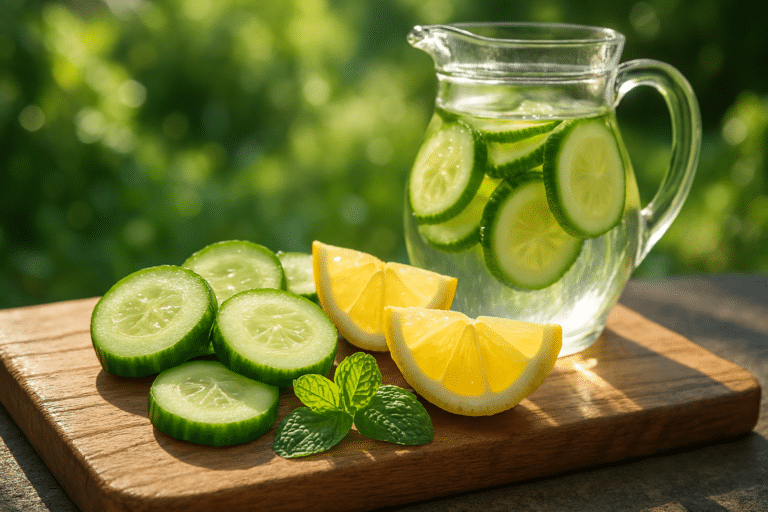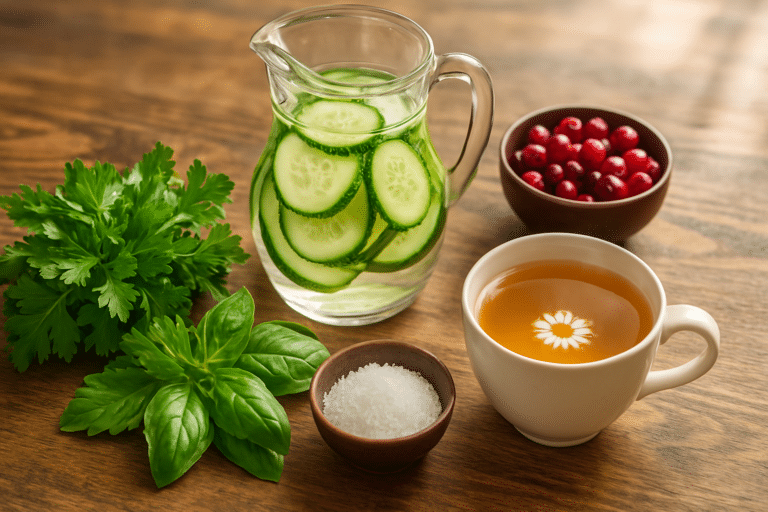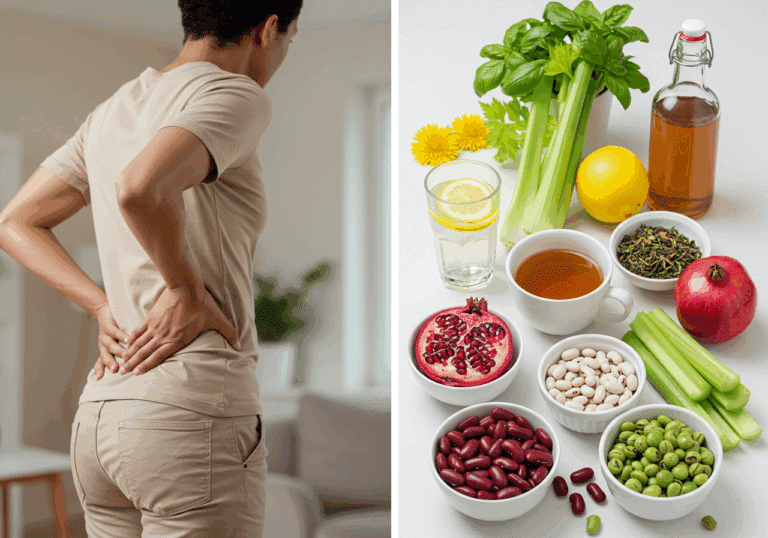Food Poisoning: 6 Gentle Home remedies for Mild Food Poisoning Symptoms

If you’ve ever experienced the discomfort of mild food poisoning, you know how essential it is to manage your symptoms effectively. Knowing the right steps can make all the difference in your recovery. Staying hydrated and getting enough rest are just the beginning. There are several strategies you can use to ease your symptoms and help your body heal. Let’s explore these food poisoning remedies together and find the best approach for you.
Stay Hydrated With the Right Fluids
Staying hydrated is essential when dealing with food poisoning. You lose significant fluids through vomiting and diarrhea, making consistent hydration important to prevent dehydration. Electrolytes like sodium and potassium play a critical role in maintaining your body’s fluid balance, so it’s important to replenish them. Consider sipping on watered-down fruit juices, broths, or oral rehydration solutions, which are designed for efficient hydration. Sports drinks can also help, but watch out for their sugar content. If you’re feeling nauseous, take small sips of clear liquids to manage vomiting.
Dehydration is a significant risk associated with food poisoning, so keeping an eye on your hydration levels is key; severe dehydration can lead to serious health complications, so stay proactive about your fluid intake. Additionally, it’s wise to choose electrolyte-rich liquids like broths to further support your hydration efforts.
Remember that the immune system plays a crucial role in preventing food poisoning, so maintaining hydration can help support its function during recovery. Oral rehydration solutions are effective for replenishing electrolytes, making them a great option during recovery.
Prioritize Rest and Avoid Strenuous Activities
When you’re dealing with food poisoning, prioritizing rest is essential for your recovery. Limiting physical activity conserves your energy and helps stabilize your body’s functions. Fluid replacement is also crucial to prevent dehydration, so make sure to stay hydrated while you rest.
Additionally, remember that approximately 1 in 6 people in the U.S. experience foodborne illness annually, highlighting the importance of taking your symptoms seriously. If vomiting occurs, it is important to start with ice chips only to help manage dehydration effectively. Symptoms typically last for 24 to 48 hours, so be patient with your recovery process.
Importance of Rest
Rest is essential for your recovery from food poisoning, as it allows your body to redirect its energy towards healing. By prioritizing rest, you enable your body to recover faster and reduce stress, making the healing process smoother. Adequate rest replenishes the energy you lost during episodes of food poisoning and helps ease stomach sensitivity.
When you rest, your overall health improves, allowing your bodily systems to return to normal functions. Additionally, rest enhances your immune response against infections and reduces the risk of complications. To create a restful environment, keep your space cool, quiet, and dimly lit, helping you focus on recovery. Hydration is also crucial during this time, as it supports recovery by replenishing lost fluids and electrolytes.
Limit Physical Activity
While your body fights off the effects of food poisoning, limiting physical activity is essential for a smoother recovery. Strenuous exercise can strain your body, especially if you have a fever, increasing the risk of complications. Instead of high-intensity workouts or competitive sports, focus on gentle activities like light stretching or short walks, which help maintain some movement without overexertion.
Monitor your body closely; if you feel fatigued, stop immediately. Staying hydrated is crucial, as dehydration from food poisoning can worsen your condition and lead to further complications. Pay attention to any abdominal discomfort or breathing issues. Prioritize restorative sleep and relaxation to support your immune system.
Gradually Reintroduce Bland Foods
As your body starts to recover from food poisoning, it’s important to gradually reintroduce bland foods to aid digestion and minimize discomfort.
Begin by focusing on hydration with electrolyte-rich fluids like water and coconut water. Once vomiting subsides, sip clear liquids every 15 minutes. Increasing fluid intake is crucial to replace lost fluids and prevent dehydration.
When you’re ready for solid food, start with the BRAT diet: bananas, rice, applesauce, and plain toast. These options are gentle on your stomach and help stabilize digestion. It’s also crucial to ensure you’re consuming clear liquids to help rehydrate your body during this recovery phase.
You can later add boiled potatoes, plain oatmeal, and skinless baked chicken. Remember to avoid high-fiber foods initially and limit dairy.
As your tolerance improves, slowly reintroduce soft fruits and steamed vegetables over the next few days to support your recovery.
Monitor and Manage Symptoms Effectively
Once you’ve started reintroducing bland foods, monitoring and managing your symptoms effectively becomes essential for your recovery. Keep track of the frequency and duration of vomiting or diarrhea, and watch for signs of dehydration like dry mouth or dizziness. If symptoms persist for more than 48 hours or if you notice bloody stools or vomit, seek medical help.
Additionally, be aware that poison control centers can provide guidance on food poisoning symptoms and treatment options if you’re unsure about what to do next. Stay hydrated by sipping small amounts of water or oral rehydration solutions, avoiding caffeine and sugary drinks. Remember that staying hydrated is crucial, as dehydration can lead to serious complications.
It’s important to note that severe dehydration symptoms can include little to no urine output and difficulty keeping fluids down. Limit physical activity to conserve energy and isolate yourself for at least 24 hours after a fever. If you experience severe symptoms, such as high fever or neurological issues, contact a healthcare provider immediately for guidance on next steps.
Practice Safe Food Handling and Hygiene
When it comes to preventing food poisoning, practicing safe food handling and hygiene is essential. You should always wash your hands thoroughly after handling raw foods and store perishables correctly to reduce bacterial growth. Access to safe and nutritious food is crucial in preventing foodborne illnesses and ensuring overall health. Additionally, following the four steps to food safety can significantly minimize the risk of contamination in your kitchen.
Handwashing Techniques
Proper handwashing techniques are essential for preventing foodborne illnesses, reducing the risk of diarrheal diseases by 23–48%.
Make it a habit to wash your hands for at least 20 seconds with warm water and soap before preparing meals. Scrub all surfaces, including palms, backs, between fingers, and under nails.
After washing, dry your hands with a clean towel or air dryer, avoiding recontamination by using a towel to turn off the tap.
Key moments for handwashing include after touching garbage, raw meat, or your phone.
Proper Food Storage
Handwashing lays the foundation for safe food practices, but proper food storage is just as essential in preventing foodborne illnesses.
Always refrigerate perishables below 40°F (4°C) and freeze foods at 0°F (-18°C) to halt bacterial growth. If perishables sit out for more than two hours, toss them—one hour if it’s above 90°F (32°C).
Keep raw meats and eggs on the bottom shelves to avoid drips contaminating other foods. Use airtight containers and label everything with contents and dates.
Remember to follow “use-by” dates and consume leftovers within 3-4 days. Additionally, non-compliance with food safety standards can lead to foodborne illness outbreaks, so proper storage is crucial for safety.
Finally, never thaw foods at room temperature; use the fridge, cold water, or microwave instead. Proper storage helps keep your food safe and healthy!
Be Aware of Special Considerations for Vulnerable Groups
Here are some critical considerations:
- Pregnant women: Can face serious complications from pathogens like *Listeria* and *Toxoplasma*.
- Elderly individuals: Age-related immune decline makes them vulnerable to *Salmonella* and *E. coli* infections.
- Children under 5: Their immature immune systems can lead to severe dehydration from pathogens.
For these vulnerable groups, it’s essential to practice stringent food safety measures and seek medical attention promptly if symptoms arise. Additionally, awareness of oral cancer tests can help in recognizing any severe health issues that might develop from foodborne illnesses.
Prioritizing their safety can prevent serious health issues.
Frequently Asked Questions
How Long Does Food Poisoning Typically Last?
Food poisoning typically lasts between 12 to 48 hours, though symptoms can sometimes extend beyond a week. Your recovery time depends on the pathogen involved and your immune system’s response to it.
When Should I See a Doctor for Food Poisoning?
If you experience severe symptoms like high fever, blood in vomit, or persistent pain, don’t wait—see a doctor. Also, if symptoms worsen after 48 hours, it’s essential to get medical attention immediately.
Can Food Poisoning Be Caused by Contaminated Water?
Yes, food poisoning can be caused by contaminated water. When you consume food prepared with tainted water, harmful pathogens can enter your system, leading to illness. Always make certain your water source is clean and safe.
What Are Common Foods That Cause Food Poisoning?
Common foods that cause food poisoning include eggs, poultry, seafood, deli meats, unpasteurized dairy, and fresh produce. Always make sure to handle and store these items properly to reduce the risk of illness.
Is It Safe to Exercise During Food Poisoning Recovery?
It’s best to avoid exercising during food poisoning recovery until your symptoms greatly decrease. Listen to your body, start slowly, and make certain you’re well-hydrated before considering any physical activity. Always consult a doctor if unsure.
Conclusion
In conclusion, taking care of mild food poisoning at home can be manageable with easy, quick remedies. Stay hydrated, get plenty of rest, and slowly reintroduce bland foods to help your body recover. Keep an eye on your symptoms and practice good hygiene to avoid further issues. If you or someone vulnerable is affected, don’t hesitate to seek medical advice. By following these tips, you’ll support your recovery and feel better in no time.
References
- https://www.webmd.com/digestive-disorders/remedies-for-food-poisoning
- https://my.clevelandclinic.org/health/diseases/21167-food-poisoning
- https://www.piedmont.org/living-real-change/how-to-treat-food-poisoning
- https://www.niddk.nih.gov/health-information/digestive-diseases/food-poisoning/treatment
- https://www.nhs.uk/conditions/food-poisoning/
- https://www.healthline.com/health/food-nutrition/what-to-eat-after-food-poisoning
- https://www.uhc.com/news-articles/healthy-living/3-tips-when-you-have-food-poisoning
- https://www.goodrx.com/conditions/food-poisoning/what-to-eat-drink-after-food-poisoning
- https://www.mayoclinic.org/diseases-conditions/food-poisoning/diagnosis-treatment/drc-20356236
- https://crispregional.org/food-poisoning-recovery-how-to-find-relief-and-get-back-on-your-feet/






